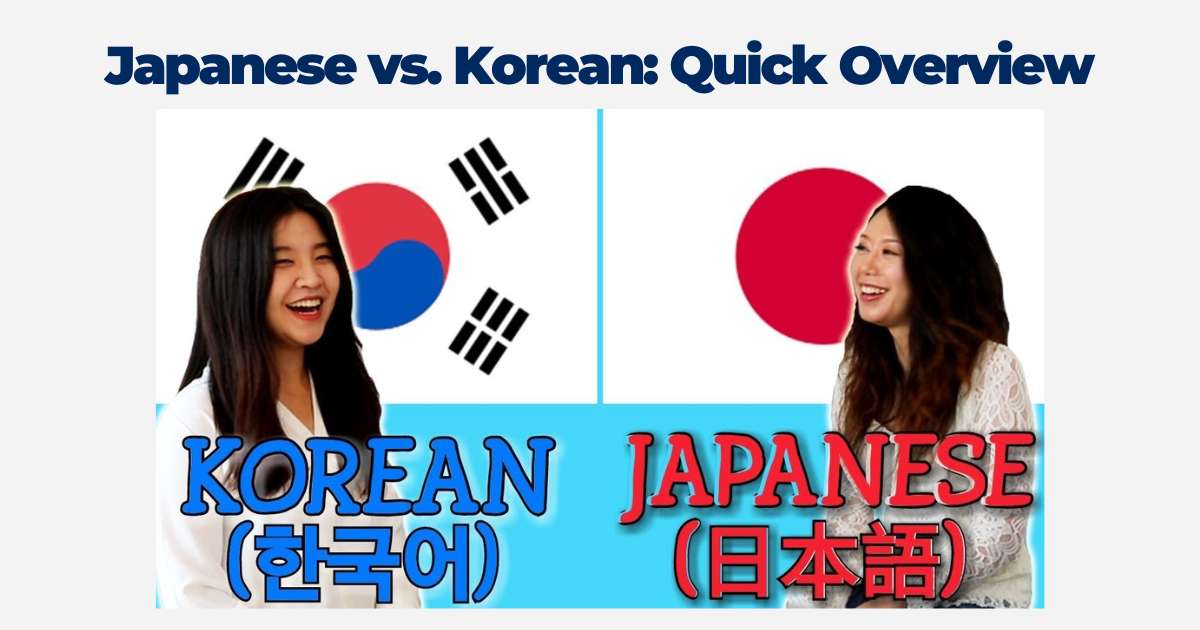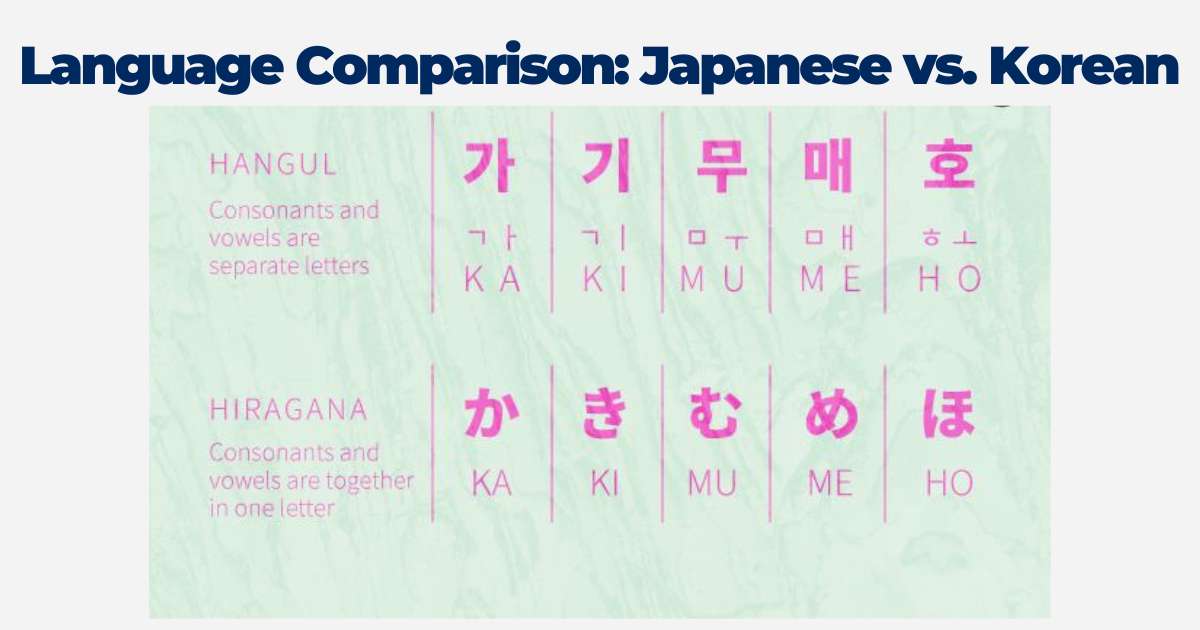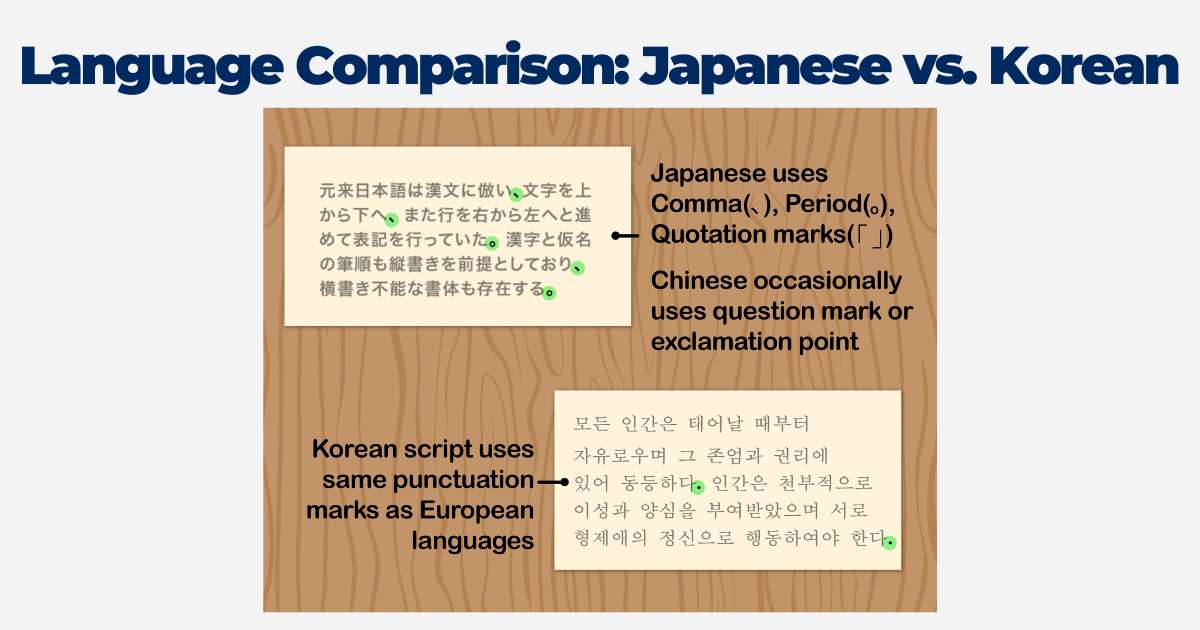Japanese vs Korean: Quick Overview
Before you decide which to learn between Japanese vs Korean, let’s take a look at the basic features of each language.

Japanese Language at a Glance:
- Writing system: Hiragana, Katakana, and Kanji (logographic characters from Chinese)
Grammar: Subject-Object-Verb (SOV) word order; uses politeness levels and keigo (honorific speech) - Speakers: ~125 million native speakers, mainly in Japan
Korean Language at a Glance:
- Writing system: Hangul – a scientific and phonetic alphabet designed for simplicity
- Grammar: Also uses SOV structure; features consistent grammar with complex particles
- Speakers: ~80 million native speakers, mainly in South Korea and North Korea
Cultural Influence:
Whether you want to learn Japanese vs Korean, both cultures offer global impact:
- Japanese: Anime, manga, samurai traditions, tea ceremonies, and global cuisine
- Korean: K-pop, Korean dramas, tech innovation, Korean BBQ, and skincare
Language Comparison: Japanese vs. Korean
So, should you learn Japanese vs Korean first? Let’s compare major components of each language.
Japanese vs Korean’s Writing System: Which Is Easier?

| Language | Writing System | Difficulty |
| Japanese | Hiragana + Katakana + Kanji | ❌ Kanji takes years to master |
| Korean | Hangul (phonetic alphabet) | ✅ Easy to learn in hours or days |
Verdict: Korean is easier for writing and reading. Hangul’s logic and simplicity make it one of the easiest scripts in the world for beginners.
Japanese vs Korean’s Grammar & Sentence Structure

- Similarities:
- Both use SOV order
- Both have honorifics and politeness levels
- Differences:
- Korean grammar is more consistent, though particles can be confusing
- Japanese grammar includes complex keigo and varying verb forms
Verdict: Both are challenging, but Korean grammar is slightly easier for beginners due to consistency.
Japanese vs Korean’s Pronunciation
- Japanese:
- Few consonants and simple vowels
- Pitch accent (learnable)
- Korean:
- More consonant sounds (tense, lax, aspirated)
- Sound assimilation and fast speech
Verdict: Most English speakers find Japanese easier to pronounce early on — a helpful factor if you’re deciding to learn Japanese or Korean based on speaking skills.
Japanese vs Korean’s Vocabulary & Loanwords
- Korean: Uses many English loanwords (e.g., 컴퓨터 “computer”), making initial vocabulary easier to guess
- Japanese: Influenced heavily by Chinese; many words may seem unfamiliar at first
Verdict: To make early learning smoother, especially for speaking and listening, it might be easier to learn Korean thanks to familiar vocabulary.
Japanese vs Korean? Why Do You Want to Learn a Language?
Choosing between Japanese vs Korean isn’t only about grammar or writing, it’s about motivation.

Japanese vs Korean’s Cultural and Motivation Triggers
- Japanese: Fans of anime, manga, traditional arts (like calligraphy or martial arts) will feel more connected to Japanese culture.
- Korean: If you love K-pop, K-dramas, or Korean fashion and beauty, Korean offers a more relevant gateway.
Ask yourself: Which culture motivates you more?
Japanese vs Korean’s Career and Practical Use
- Korean:
- Growing job markets in tech, media, and education
- Opportunities with companies like Samsung, LG, Hyundai
- Japanese:
- Strong business presence in automotive, robotics, and manufacturing
- Japanese is a major asset for international business and academia
Tip: Choose the language that aligns best with your career goals.
Japanese vs Korean? Summary Table
| Feature | Japanese | Korean |
| Script Difficulty | High (Kanji takes years) | Low (Hangul is easy) |
| Pronunciation | Easier | More complex |
| Grammar Consistency | Less consistent | More consistent |
| Vocabulary for Beginners | Less recognizable | More English loanwords |
| Cultural Appeal | Anime, manga, tradition | K-pop, dramas, tech |
| Career Focus | Engineering, business | Media, beauty, tech |
| Time to Conversation | 2–3 years | 1–2 years |
So, Japanese vs Korean? Which Language Should You Learn First?
- Want to read and write quickly? → Learn Korean first
- Love anime, manga, and traditional Japan? → Start with Japanese
- Need easier pronunciation and structure? → Japanese is slightly more beginner-friendly
- Want fast results and modern pop culture access? → Korean is your best bet
Both languages share grammar and many Sino-root similarities. Some learners even benefit from learning both in parallel, using one to reinforce the other.
Japanese vs Korean? Learning Resources & Methods
Whichever path you choose, these apps and platforms can help:
- For Japanese: Gurulango, WaniKani (Kanji), Tae Kim’s Guide, Busuu, HelloTalk
- For Korean: Talk To Me In Korean, Gurulango, LingoDeer, Drops, Duolingo, 90 Day Koreanư
Whatever your choice, to learn Japanese vs Korean, let your passion lead the way. Consistency beats speed, and interest keeps motivation high. Start today at GuruLango and build your language skills the smart way!
FAQ
Is Korean closer to Japanese vs Chinese?
Korean and Japanese share grammar similarities, but Korean is linguistically closer to Japanese than Chinese.
Is Korean grammar much harder than Japanese?
Not necessarily. Korean grammar is more consistent but includes many particles. Japanese has complex polite forms.
Which is easier for English speakers?
Korean is easier to start due to Hangul and vocabulary. Japanese has simpler pronunciation.
How to tell if it’s Korean vs Japanese?
- Korean: Uses Hangul (rounded letters and blocks)
- Japanese: Uses a mix of Kanji (complex characters), Hiragana, and Katakana